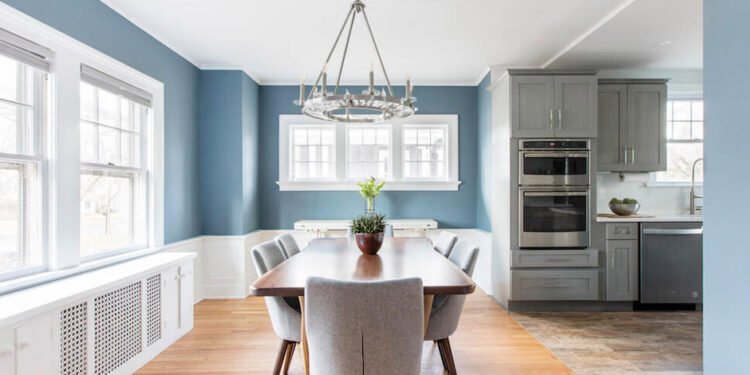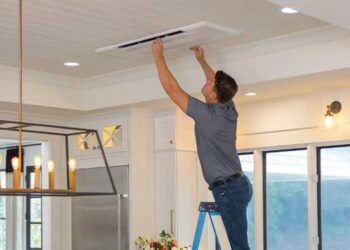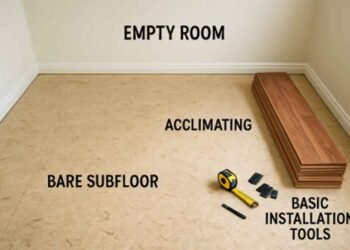Renovating a home in New Jersey can be an exciting yet daunting task. Whether you’re updating your kitchen, expanding your living space, or transforming your entire house, home renovations offer the opportunity to customize your living space to better suit your lifestyle. However, the process can be complex, with various legal and practical considerations to keep in mind. From obtaining permits to selecting the right contractor, a home renovation project in NJ requires thoughtful planning and execution.
In this guide, we’ll walk you through the essential steps to help make your renovation project a success.
Determine Your Budget
The first step in any home renovation is to set a budget. Knowing how much you’re willing to spend is crucial in helping you make decisions on everything from materials to the scope of your project. In New Jersey, the average cost for a home renovation ranges between $20,000 to $80,000, depending on the scale of the project. Keep in mind that unforeseen expenses can arise, so it’s wise to build in a contingency fund—usually around 10-20% of your total budget.
Factors to consider when setting your budget:
- Size of the renovation (full home remodel vs. single room)
- Type of materials (luxury vs. standard)
- Contractor fees
- Permit and inspection costs
- Hidden costs like plumbing, electrical work, or unforeseen structural repairs
If you’re unsure about how to budget effectively, consult with a financial advisor or a renovation expert to get a clearer understanding of potential costs.
Research Local Regulations and Obtain Permits
One of the most critical aspects of remodeling bathroom in NJ is understanding local building regulations and securing the necessary permits. Each municipality in New Jersey may have different requirements, so it’s essential to contact your town or city hall to ensure you’re following the law.
Common permits you may need include:
- Building permits: For structural changes, additions, or major renovations.
- Electrical and plumbing permits: For any updates or changes to your home’s wiring or plumbing systems.
- Zoning permits: If you’re planning to add a new structure or extension to your property.
Failing to obtain the right permits can result in fines, delays, or even having to redo work that wasn’t approved. Ensure all paperwork is in order before you begin construction.
Hire the Right Contractor
Choosing the right contractor is one of the most important decisions you’ll make during your renovation. A skilled, reliable contractor can make all the difference between a smooth renovation and a nightmare. When selecting a contractor in New Jersey, consider the following:
- Licensing and insurance: Make sure your contractor is licensed to work in New Jersey and carries liability insurance to protect both parties in case of accidents.
- Reputation: Look for contractors with excellent reviews and testimonials from previous clients. You can check online platforms like Yelp, Google Reviews, or the Better Business Bureau.
- Experience in NJ-specific renovations: Given New Jersey’s varied climate, it’s essential to hire someone familiar with the specific needs of homes in the state, such as insulation for cold winters or weatherproofing for coastal properties.
- Quotes and contracts: Get multiple quotes from different contractors, and ensure that you receive a detailed contract outlining the scope of work, cost breakdowns, and timelines.
Don’t be afraid to ask for references or to visit other homes the contractor has worked on to assess the quality of their work.
Plan Your Renovation Timeline
The timing of your renovation is another critical consideration. In New Jersey, the weather can have a big impact on construction, especially for exterior projects. Harsh winters and unpredictable spring rains can cause delays, so it’s best to schedule major renovations during warmer months when the weather is more cooperative.
Typical project timelines:
- Kitchen renovation: 6-12 weeks
- Bathroom remodel: 4-8 weeks
- Full home renovation: 6 months to a year
Discuss the timeline with your contractor and build in some flexibility in case of unexpected delays. It’s also a good idea to plan alternative living arrangements if the renovation will render your home temporarily uninhabitable.
Choose Quality Materials
Selecting the right materials is another crucial aspect of your renovation. New Jersey homes are exposed to varying weather conditions throughout the year, so it’s essential to choose materials that can withstand these changes.
For example:
- Exterior materials: If you’re updating your siding or roof, opt for materials that are durable and weather-resistant, such as vinyl or fiber cement for siding and asphalt shingles or metal roofing.
- Flooring: Consider water-resistant materials like luxury vinyl or porcelain tile for areas prone to moisture, such as kitchens and bathrooms.
- Windows and doors: Energy-efficient windows and doors can help lower your heating and cooling bills, which is particularly important in NJ, where temperatures can vary significantly throughout the year.
Quality materials might cost more upfront but will save you money in the long run by reducing maintenance costs and improving energy efficiency.
Focus on Energy Efficiency
New Jersey offers several programs to encourage homeowners to adopt energy-efficient upgrades. For example, the New Jersey Clean Energy Program provides rebates and incentives for energy-efficient heating and cooling systems, windows, insulation, and more. By making energy-efficient upgrades, you can lower your utility bills and make your home more eco-friendly.
Popular energy-efficient renovations include:
- Insulation: Proper insulation will keep your home warmer in the winter and cooler in the summer, reducing the need for constant heating or air conditioning.
- Solar panels: New Jersey has strong incentives for installing solar energy systems, which can help you reduce your carbon footprint and save on electricity.
- LED lighting and smart thermostats: These small changes can make a big difference in reducing your overall energy consumption.
Stay Involved and Monitor Progress
Even after you’ve hired a contractor, it’s essential to stay involved in your renovation. Regularly communicate with your contractor and visit the site to ensure everything is going according to plan. Address any issues immediately to avoid costly delays or rework.
Additionally, make sure to keep records of all payments, receipts, and contracts. This documentation will be helpful if any disputes arise or if you decide to sell your home in the future and need to prove that renovations were done according to code.
Prepare for the Unexpected
No matter how well you plan, unexpected issues can arise during a renovation. From discovering structural damage to delays in material delivery, surprises are common. The key is to remain flexible and adapt to challenges as they come up. A contingency budget and a clear line of communication with your contractor will go a long way in helping you manage any setbacks.
Renovating your home in New Jersey can be a rewarding experience, allowing you to create a space that reflects your style and meets your needs. By setting a budget, understanding local regulations, choosing the right contractor, and focusing on quality materials and energy efficiency, you can ensure that your renovation goes smoothly and adds value to your home.
Remember, patience and planning are key to a successful renovation. Whether you’re updating a single room or embarking on a full-scale remodel, these steps will help you navigate the process and create the home of your dreams in the Garden State.












